When it comes to breakfasts that are both wholesome and downright irresistible, cottage cheese eggs take the cake—or should I say the skillet? This dynamic duo combines the creamy tanginess of cottage cheese with the fluffy richness of eggs, creating a dish that’s not only delicious but also packed with health benefits. Whether you’re rushing through a weekday morning or enjoying a laid-back weekend brunch, this recipe delivers on all fronts. Stick with us as we crack into everything you need to know about this nutritional superstar—from how to make it to the incredible ways it can boost your health.
Cottage Cheese Eggs
What Are Cottage Cheese Eggs?
Imagine scrambled eggs, but better—yes, that’s cottage cheese eggs! These aren’t your average eggs. Mixing cottage cheese into the scramble gives the dish a rich, velvety texture that you just can’t achieve with plain eggs. The cheese melts into the eggs as they cook, creating pockets of creamy goodness with every bite. What’s more, this dish is versatile enough to fit any dietary plan, from low-carb and keto to high-protein lifestyles.
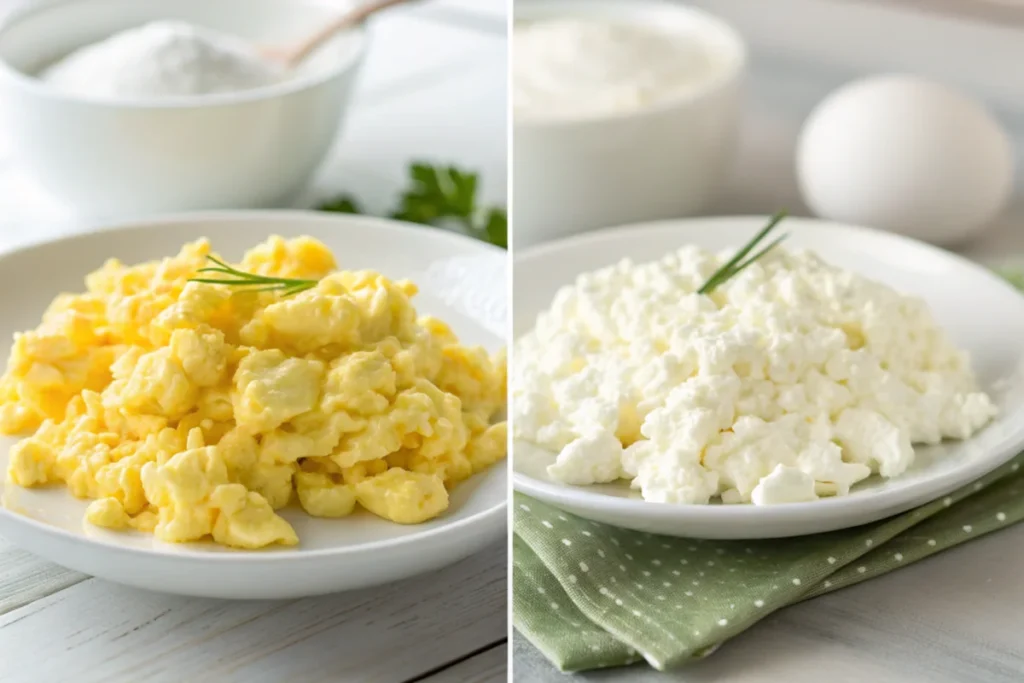
Why Cottage Cheese Eggs Are Trending
If you’ve been scrolling through recipe blogs or Instagram food posts, you’ve probably noticed that high-protein breakfast recipes are all the rage. And for good reason! Cottage cheese eggs combine simplicity and nutrition in a way that few dishes can match. They’re easy to whip up in under 10 minutes, customizable with your favorite add-ins, and perfect for fueling your day without weighing you down.
Plus, let’s face it—who doesn’t love an egg recipe with a twist? Whether you’re feeding a family, impressing brunch guests, or just making something quick for yourself, this dish fits the bill.
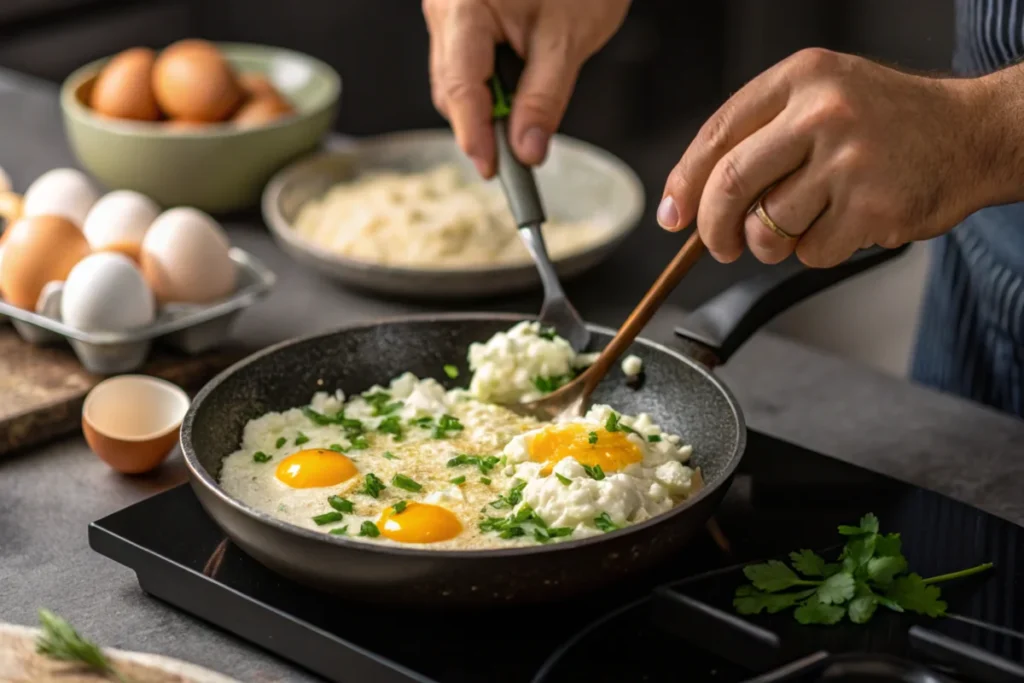
Nutritional Benefits of Cottage Cheese and Eggs
Protein Powerhouse: Fuel Your Day Right
When it comes to nutritional all-stars, cottage cheese eggs steal the spotlight. Both cottage cheese and eggs are jam-packed with high-quality protein, making this dish ideal for anyone aiming to build muscle, stay energized, or simply enjoy a satiating meal. A single serving of eggs provides about 6 grams of protein, while cottage cheese packs an impressive 14 grams per half-cup. Combined, they deliver a protein punch that keeps hunger at bay for hours.
Nutritional Content Per 100g
| Nutrient | Cottage Cheese | Eggs |
|---|---|---|
| Calories (kcal) | 98 | 155 |
| Protein (g) | 11.1 | 13 |
| Fat (g) | 4.3 | 11 |
| Carbohydrates (g) | 3.4 | 1.1 |
| Calcium (mg) | 83 | – |
| Cholesterol (mg) | – | 373 |
However, protein isn’t just about muscles, rather, it’s the building block for strong hair, glowing skin, and even a sharper mind. Furthermore, starting your day with this protein-rich combo can set the tone for healthier choices throughout the day.
Low-Carb and Keto-Friendly Goodness
For those cutting carbs or following a keto-friendly diet, cottage cheese eggs are a dream come true. Eggs contain virtually no carbohydrates, and depending on the brand, cottage cheese is typically low-carb as well. The creamy texture of the cheese makes it feel indulgent, even though it’s perfectly aligned with keto goals.
This dish is also a fantastic alternative to carb-heavy breakfast options like bagels or cereal. Instead of feeling sluggish after eating, you’ll feel light and energized—a win-win!
Loaded with Essential Vitamins and Minerals
Indeed, did you know that cottage cheese eggs are not only a nutritional treasure trove because of their protein but also for a multitude of other health benefits? Specifically, eggs are a fantastic source of vitamin D, which helps your body absorb calcium — and therefore, they perfectly complement the calcium-rich cottage cheese. Consequently, together, they work to support bone health and boost immunity.
In addition, this dish is packed with B vitamins, selenium, and phosphorus, all of which contribute to overall health. Whether you’re looking to improve your energy levels or fortify your bones, this meal checks all the boxes.
How to Make Cottage Cheese Eggs
Essential Ingredients
Creating a dish as flavorful and versatile as cottage cheese eggs doesn’t require a long list of fancy ingredients. In fact, the simplicity of this recipe is one of its biggest charms! Here’s what you’ll need to whip up this creamy, protein-packed breakfast:
- Eggs (3 large): These are the heart of the recipe, providing a fluffy, satisfying base.
- Cottage Cheese (¼ cup): Use full-fat cottage cheese for extra creaminess, or opt for low-fat if you prefer a lighter version.
- Butter (1 tablespoon): For cooking, it adds richness and prevents sticking. You can substitute with olive oil or ghee for dietary preferences.
- Salt and Pepper (to taste): Simple seasoning is all you need, but feel free to jazz it up with garlic powder or paprika.
- Optional Add-Ins: Chopped spinach, diced tomatoes, or shredded cheese (cheddar, anyone?) can elevate the flavor profile.
Substitution tip: For a dairy-free version, you can swap cottage cheese with silken tofu for a similar creamy texture. Vegan egg substitutes also work well for those avoiding animal products.
Step-by-Step Recipe Guide
Making cottage cheese eggs is as easy as 1-2-3! This recipe is perfect for beginners or busy folks who want something quick yet impressive.
Prep Time: 5 minutes
Cook Time: 5 minutes
Servings: 1
Instructions:
- Crack and Whisk: In a bowl, crack the eggs and whisk them until the yolks and whites are fully combined. Stir in the cottage cheese, ensuring it’s evenly distributed. Sprinkle in a pinch of salt and pepper.
- Heat the Pan: Place a non-stick skillet on medium heat. Melt the butter, swirling it around to coat the pan.
- Cook the Eggs: Pour the egg mixture into the skillet. Let it sit for 10–15 seconds, then gently stir with a spatula, scraping the edges toward the center.
- Low and Slow: Continue cooking on low heat, stirring occasionally, until the eggs are just set but still creamy. Overcooking will make them dry, so pull them off the heat when they look slightly underdone—they’ll finish cooking from residual heat.
- Serve and Enjoy: Therefore, plate your fluffy, cheesy eggs immediately. Then, garnish with fresh herbs, such as parsley or chives, for an added pop of both flavor and color.
Cooking Tips for Perfect Texture
Mastering the perfect cottage cheese eggs is all about technique. These expert tips will ensure your dish turns out flawless every single time:
- Don’t Overmix: When whisking the eggs and cottage cheese, keep it gentle. Overmixing can break down the texture and make the eggs watery.
- Use Low Heat: Patience is key! Cooking on low heat prevents the eggs from becoming rubbery and ensures they remain soft and velvety.
- Mind the Pan: A non-stick skillet is your best friend here. It ensures easy cleanup and prevents the eggs from sticking.
- Experiment with Textures: If you like a chunkier texture, leave the cottage cheese slightly clumped rather than blending it completely with the eggs.
- Season After Cooking: Adding salt during the cooking process can make the eggs weep moisture. Instead, season lightly beforehand and adjust once they’re done.
With these tips, you’re well on your way to becoming a cottage cheese egg pro!
Delicious Variations of Cottage Cheese Eggs
One of the best things about cottage cheese eggs is their incredible versatility. Whether you’re in the mood for a hearty scramble, a filling omelet, or a grab-and-go snack, there’s a variation to suit every craving. Let’s explore three creative twists on this classic dish.
Spinach and Cottage Cheese Scramble
For those who love a pop of green in their breakfast, a spinach and cottage cheese scramble is a no-brainer. Spinach not only adds color but also packs a punch of nutrients like iron, calcium, and vitamins.
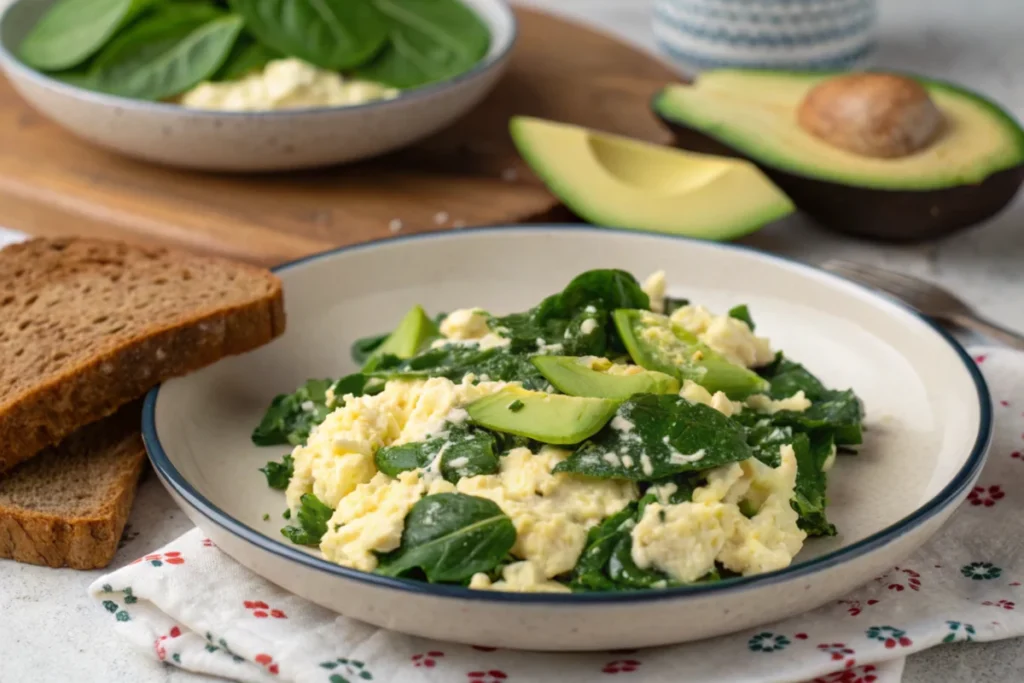
How to Make It:
- Follow the basic recipe for cottage cheese eggs but toss a handful of fresh spinach into the pan before adding the eggs.
- Sauté the spinach lightly until it wilts, then pour in the egg and cottage cheese mixture.
- Cook on low heat, stirring gently, until the eggs are fluffy and the spinach is evenly distributed.
This variation pairs beautifully with whole-grain toast or a side of sliced avocado for a balanced breakfast.
Cottage Cheese Omelet
Indeed, turn your cottage cheese eggs into a protein-packed omelet simply by folding in your favorite add-ins. For instance, from vibrant veggies to lean meats, the options are practically endless.
How to Make It:
- Whisk eggs with cottage cheese and a pinch of salt and pepper.
- Heat butter or olive oil in a skillet, then pour in the mixture, letting it spread evenly.
- Once the bottom is set, add fillings like sautéed mushrooms, bell peppers, diced tomatoes, or shredded chicken to one side.
- Fold the other side over, cook for another minute, and slide onto a plate.
Customize with herbs like parsley or basil for a gourmet touch.
Baked Cottage Cheese Egg Cups
If you’re always on the go, baked cottage cheese egg cups are the perfect solution. These portable, portion-sized bites are great for meal prepping and can be stored for up to three days in the fridge.
How to Make It:
- Preheat your oven to 350°F (175°C).
- In a mixing bowl, combine eggs, cottage cheese, and any desired mix-ins like diced onions, spinach, or grated zucchini.
- Pour the mixture into a greased muffin tin, filling each cup about two-thirds full.
- Bake for 15–18 minutes, or until the tops are golden and set.
Pop one or two in the microwave for a quick, nutritious breakfast or snack.
Tips and Tricks for Cooking Cottage Cheese Eggs
Mastering cottage cheese eggs is easy, but a few expert tips can take your dish from good to great. From avoiding common pitfalls to saving time in the kitchen, here’s everything you need to know to perfect your breakfast game.
Common Mistakes to Avoid
- Overcooking the Eggs: Eggs cook quickly, and leaving them on the heat for too long will make them rubbery instead of soft and creamy. Always cook on low heat and remove the pan just before the eggs are fully set. They’ll continue cooking from residual heat.
- Underseasoning or Overseasoning: It’s tempting to add a heavy hand of salt, but cottage cheese already contains some sodium. Start with a light sprinkle, then taste and adjust after cooking to avoid overpowering the flavor.
- Ingredient Imbalances: Too much cottage cheese can make the eggs watery, while too little won’t achieve the desired creaminess. Stick to a ratio of about 1/4 cup of cottage cheese for every three eggs for the best results.
Hacks for Time-Saving Preparation
- Pre-Cut Veggies: If you’re adding vegetables like spinach, bell peppers, or onions to your dish, buy pre-chopped options to save valuable time in the morning rush.
- Meal Prep Your Eggs: Whisk the eggs and cottage cheese together the night before and store them in an airtight container in the fridge. In the morning, just pour the mixture into a skillet, and you’re good to go.
- Use Ready-to-Eat Cottage Cheese: Opt for smooth, pre-mixed cottage cheese varieties if you don’t want to deal with clumps. This saves both prep and cooking time.
Storage and Reheating Instructions
Made too much? No problem! Cottage cheese eggs store well when handled properly:
- Storing Leftovers: Let the eggs cool completely before transferring them to an airtight container. Refrigerate them for up to 3 days.
- Freezing Tips: If you plan to freeze, portion the eggs into single servings and store them in freezer-safe bags or containers. They’ll last up to 2 months.
- Reheating While Retaining Flavor: For the best texture, reheat in a skillet over low heat, adding a splash of milk or water to revive their creaminess. Microwaving is faster but tends to dry them out, so use a microwave-safe bowl, cover with a damp paper towel, and heat in short bursts.
Serving Suggestions and Pairings
Cottage cheese eggs are a star on their own, but pairing them with the right sides and beverages elevates your meal to a whole new level. Whether you’re looking for a balanced breakfast or a complete brunch spread, these ideas have you covered.
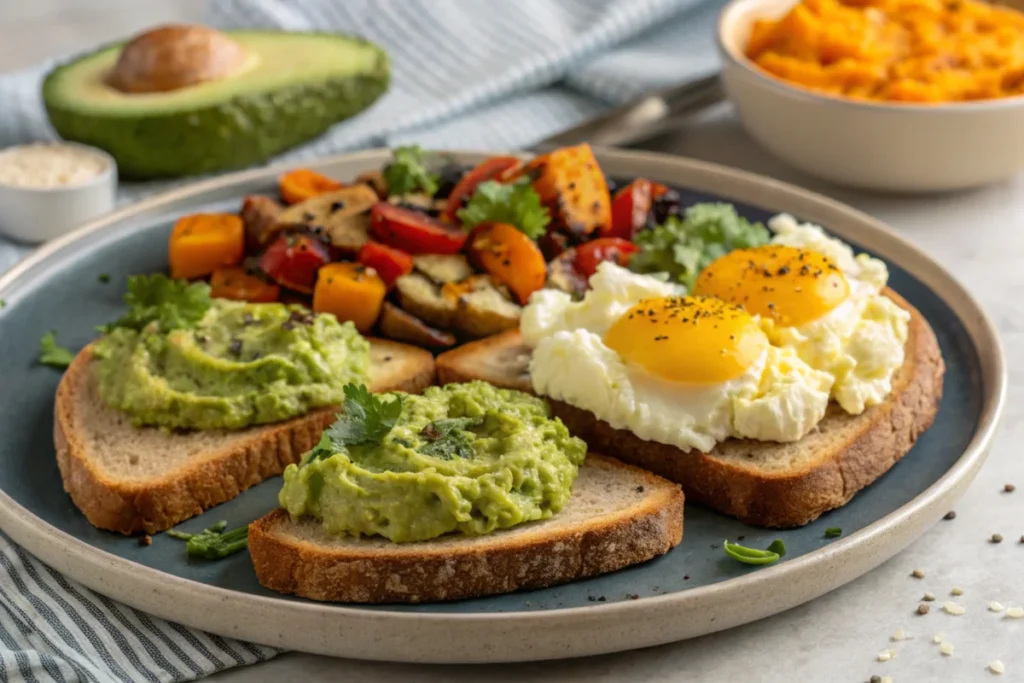
Best Side Dishes for Cottage Cheese Eggs
- Whole-Grain Toast: The buttery creaminess of cottage cheese eggs pairs wonderfully with crispy whole-grain toast. Spread some mashed avocado on top for added texture and healthy fats.
- Avocado Slices: Creamy eggs and silky avocado? Yes, please! The mild, nutty flavor of avocado complements the eggs while adding a dose of potassium and heart-healthy fats.
- Roasted Vegetables: A medley of roasted veggies like zucchini, cherry tomatoes, and bell peppers brings color, flavor, and fiber to your plate. Roasting caramelizes the natural sugars in vegetables, providing a subtle sweetness to balance the savory eggs.
- Sweet Potato Hash: For something heartier, try a side of sweet potato hash seasoned with a sprinkle of paprika. It’s a filling, nutrient-rich addition to round out your meal.
Perfect Drinks to Complement
- Freshly Squeezed Orange Juice: The bright citrus notes of orange juice bring a refreshing contrast to the creamy richness of the eggs.
- Berry Smoothie: Blend a handful of mixed berries, Greek yogurt, and a splash of almond milk for a vibrant smoothie loaded with antioxidants. It’s a sweet and tangy pairing that complements the savory eggs.
- Herbal Teas: Light, caffeine-free teas like chamomile or mint are soothing options that won’t overpower the delicate flavors of the eggs. If you need a bit of energy, green tea with a touch of honey works wonders.
Frequently Asked Questions (FAQs)
Naturally, when it comes to cottage cheese eggs, there are bound to be plenty of questions that pop up for home cooks. Therefore, here are the answers to some of the most common queries, which will ensure you’ll be a pro in no time.
Can I use low-fat cottage cheese for this recipe?
Absolutely! Low-fat cottage cheese works perfectly in this recipe and provides a lighter option for those keeping an eye on calories. However, full-fat cottage cheese gives a creamier texture and richer flavor. Choose based on your preference, but rest assured that both options deliver great results. For more tips on pairing cottage cheese with eggs, check out this guide for inspiration and recipe ideas.
Are these eggs suitable for meal prepping?
Absolutely! This dish is perfect for meal prepping, especially when prepared as baked egg cups or in large scrambled batches. Once cooked, let them cool before placing them in an airtight container. They can be refrigerated for up to three days or frozen for up to two months. Reheat gently to maintain their creamy consistency. For tips on avoiding watery cottage cheese in your eggs, check out this guide.
What spices enhance this dish?
The versatility of this recipe shines when seasoned with classic staples like salt and pepper, or you can add a twist with spices such as paprika, garlic powder, or turmeric for a golden touch. Fresh herbs like chives, parsley, or dill also greatly enhance its flavor. For inspiration, check out Gordon Ramsay’s recipe for scrambled eggs.
Conclusion and Final Thoughts
Cottage cheese eggs are a culinary gem—simple, delicious, and packed with nutritional benefits. This dish combines high-quality protein, essential vitamins, and creamy, satisfying flavors, making it perfect for anyone seeking a healthy, energizing breakfast. Whether you enjoy it scrambled, baked, or as an omelet, the versatility of cottage cheese eggs ensures there’s a version to suit every palate. Plus, its quick prep time and adaptability to various diets make it a must-try for busy mornings or leisurely brunches. Give this recipe a go, and you’ll see why it’s a beloved choice for both health enthusiasts and food lovers alike!

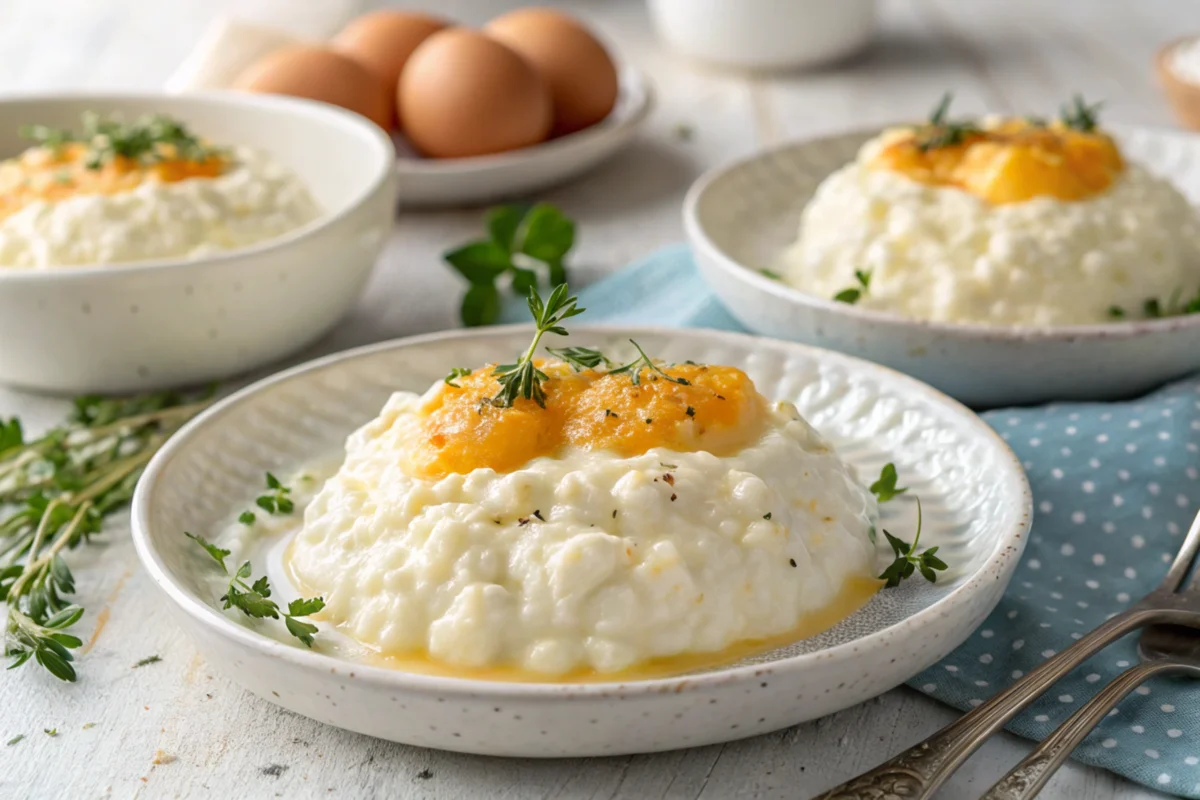
5 thoughts on “Cottage Cheese Eggs: A Creamy, Protein-Packed Breakfast Favorite”